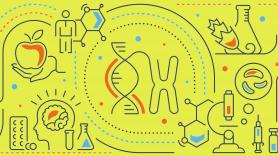2. Bacteria as a key element in synthetic biology
“Bacteria are the perfect organisms for synthetic biology, mainly due to their simplicity,” explained Jordi García Ojalvo, a professor at Pompeu Fabra University in Barcelona. It is important to remember that we already co-exist with them, and they make up a diverse ecosystem inside our bodies, which is why it is “important to understand how they live together, communicate and interact.” For example, “we know a lot about how antibiotics work,” Ojalvo said, “but, generally, on isolated species, not a community, and a bacteria’s response can be different depending on what other types it lives with.” Ojalvo’s group is working on being able to predict this type of communications in ‘synthetic’ bacteria.
‘Engineered’ bacteria can also be used to fight other bacteria. This is the work of the group led by María Lluch-Senar at CRG in Barcelona, who have used Mycoplasma pneumoniae bacteria to create a harmless ‘chassis’ to build therapeutic elements onto, which attack dangerous, resistant bacteria like those that cause ventilator-associated pneumonia. Or they can also be used to develop vaccines, designing ‘à la carte’ bacteria that optimize immune response without the risk of infection, like the group led by Carole Lartigue, at the French National Institute for Agricultural Research.
But the applications go beyond medicine, strictly speaking.
“Our planet is sick, mainly as a result of human actions,” reminded Víctor de Lorenzo, research professor at the Spanish National Research Council in Madrid (CSIC). This is happening in part because biological metabolism isn’t the same as industrial metabolism: the former is more or less circular, while the latter generates a huge amount of non-recyclable waste. “Some of the measures to combat this are reactive (decreasing production) but can we be proactive?”, he asked. Some paths lie in synthetic biology. His group is working to reprogram Pseudomonas putida bacteria, which can be very interesting for transforming industrial plastics into biodegradable products.
“The most pessimistic climate-change models have been confirmed,” lamented Ricard Solé, ICREA professor at Pompeu Fabra University in Barcelona. To fight this, his group has introduced the concept of ‘terraformation’, referring not to recreating the environment of Earth on other planets, but on the Earth itself, which is now under threat. Their study and action proposal consist in using synthetic biology to revert situations caused, for example, in particularly arid zones. This approach isn’t without problems and risks, but “every congress has to have a controversial speaker,” added Solé. “Right now, the industry isn’t very interested. In general, they are more concerned with making money than saving the planet. But we think it could work,” he concluded.



